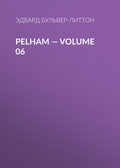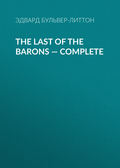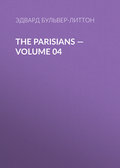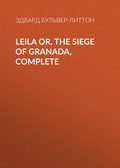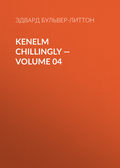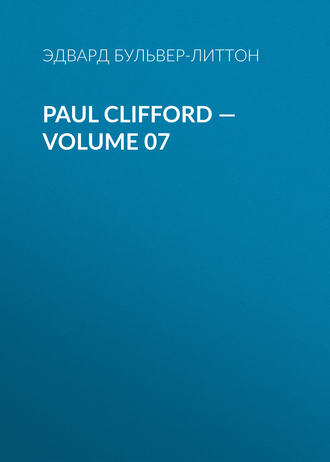
Эдвард Бульвер-Литтон
Paul Clifford — Volume 07
"Yes, yes!" muttered the judge, "no sign of infirmity is yet written here; the blood flows clear and warm enough; the cheek looks firm too, and passing full, for one who was always of the lean kine. Aha! this letter is a cordial, an elixir vitro. I feel as if a new lease were granted to the reluctant tenant. Lord Warlock, the first Baron of Warlock, Lord Chief Baron,—what next?"
As he spoke, he strode unconsciously away, folding his arms with that sort of joyous and complacent gesture which implies the idea of a man hugging himself in a silent delight. Assuredly had the most skilful physician then looked upon the ardent and all-lighted face, the firm step, the elastic and muscular frame, the vigorous air of Brandon, as he mentally continued his soliloquy, he would have predicted for him as fair a grasp on longevity as the chances of mortal life will allow. He was interrupted by the servant entering.
"It is twenty-five minutes after nine, sir," said he, respectfully.
"Sir,—sir!" repeated Brandon. "Ah, well! so late!"
"Yes, sir, and the sheriff's carriage is almost at the door."
"Humph! Minister,—Peer,—Warlock,—succession. My son, my son! would to God that I could find thee!"
Such were Brandon's last thoughts as he left the room. It was with great difficulty, so dense was the crowd, that the judge drove up to the court. As the carriage slowly passed, the spectators pressed to the windows of the vehicle, and stood on tiptoe to catch a view of the celebrated lawyer. Brandon's face, never long indicative of his feelings, had now settled into its usual gravity; and the severe loftiness of his look chilled, while it satisfied, the curiosity of the vulgar. It had been ordered that no person should be admitted until the judge had taken his seat on the bench; and this order occasioned so much delay, owing to the accumulated pressure of the vast and miscellaneous group, that it was more than half an hour before the court was able to obtain that decent order suiting the solemnity of the occasion. At five minutes before ten a universal and indescribable movement announced that the prisoner was put to the bar. We read in one of the journals of that day, that "on being put to the bar, the prisoner looked round with a long and anxious gaze, which at length settled on the judge, and then dropped, while the prisoner was observed to change countenance slightly. Lovett was dressed in a plain dark suit; he seemed to be about six feet high; and though thin and worn, probably from the effect of his wound and imprisonment, he is remarkably well made, and exhibits the outward appearance of that great personal strength which he is said to possess, and which is not unfrequently the characteristic of daring criminals. His face is handsome and prepossessing, his eyes and hair dark, and his complexion pale, possibly from the effects of his confinement; there was a certain sternness in his countenance during the greater part of the trial. His behaviour was remarkably collected and composed. The prisoner listened with the greatest attention to the indictment, which the reader will find in another part of our paper, charging him with the highway robbery of Lord Mauleverer, on the night of the of last. He occasionally inclined his body forward, and turned his ear towards the court; and he was observed, as the jury were sworn, to look steadily in the face of each. He breathed thick and hard when the various aliases he had assumed— Howard, Cavendish, Jackson, etc.,—were read; but smiled with an unaccountable expression when the list was completed, as if exulting at the varieties of his ingenuity. At twenty-five minutes past ten Mr. Dyebright, the counsel for the crown, stated the case to the jury."
Mr. Dyebright was a lawyer of great eminence; he had been a Whig all his life, but had latterly become remarkable for his insincerity, and subservience to the wishes of the higher powers. His talents were peculiar and effective. If he had little eloquence, he had much power; and his legal knowledge, was sound and extensive. Many of his brethren excelled him in display; but no one, like him, possessed the secret of addressing a jury. Winningly familiar; seemingly candid to a degree that scarcely did justice to his cause, as if he were in an agony lest he should persuade you to lean a hair-breadth more on his side of the case than justice would allow; apparently all made up of good, homely, virtuous feeling, a disinterested regard for truth, a blunt yet tender honesty, seasoned with a few amiable fireside prejudices, which always come home to the hearts of your fathers of families and thorough-bred Britons; versed in all the niceties of language, and the magic of names; if he were defending crime, carefully calling it misfortune; if attacking misfortune, constantly calling it crime,—Mr. Dyebright was exactly the man born to pervert justice, to tickle jurors, to cozen truth with a friendly smile, and to obtain a vast reputation as an excellent advocate. He began with a long preliminary flourish on the importance of the case. He said that he should with the most scrupulous delicacy avoid every remark calculated to raise unnecessary prejudice against the prisoner. He should not allude to his unhappy notoriety, his associations with the lowest dregs. (Here up jumped the counsel for the prisoner, and Mr. Dyebright was called to order.) "God knows," resumed the learned gentleman, looking wistfully at the jury, "that my learned friend might have spared himself this warning. God knows that I would rather fifty of the wretched inmates of this county jail were to escape unharmed than that a hair of the prisoner you behold at the bar should be unjustly touched. The life of a human being is at stake; we should be guilty ourselves of a crime which on our deathbeds we should tremble to recall, were we to suffer any consideration, whether of interest or of prejudice, or of undue fear for our own properties and lives, to bias us even to the turning of a straw against the unfortunate prisoner. Gentlemen, if you find me travelling a single inch from my case,—if you find me saying a single word calculated to harm the prisoner in your eyes, and unsupported by the evidence I shall call,—then I implore you not to depend upon the vigilance of my learned friend, but to treasure these my errors in your recollection, and to consider them as so many arguments in favour of the prisoner. If, gentlemen, I could by any possibility imagine that your verdict would be favourable to the prisoner, I can, unaffectedly and from the bottom of my heart, declare to you that I should rejoice; a case might be lost, but a fellow-creature would be saved! Callous as we of the legal profession are believed, we have feelings like you; and I ask any one of you, gentlemen of the jury, any one who has ever felt the pleasures of social intercourse, the joy of charity, the heart's reward of benevolence,—I ask any one of you, whether, if he were placed in the arduous situation I now hold, all the persuasions of vanity would not vanish at once from his mind, and whether his defeat as an advocate would not be rendered dear to him by the common and fleshly sympathies of a man. But, gentlemen" (Mr. Dyebright's voice at once deepened and faltered), "there is a duty, a painful duty, we owe to our country; and never, in the long course of my professional experience, do I remember an instance in which it was more called forth than in the present. Mercy, gentlemen, is dear, very dear to us all; but it is the deadliest injury we can inflict on mankind when it is bought at the expense of justice."
The learned gentleman then, after a few further prefatory observations, proceeded to state how, on the night of ———- last, Lord Mauleverer was stopped and robbed by three men masked, of a sum of money amounting to above L350, a diamond snuff-box, rings, watch, and a case of most valuable jewels,—how Lord Mauleverer, in endeavouring to defend himself, had passed a bullet through the clothes of one of the robbers,—how it would be proved that the garments of the prisoner, found in a cave in Oxfordshire, and positively sworn to by a witness he should produce, exhibited a rent similar to such a one as a bullet would produce,—how, moreover, it would be positively sworn to by the same witness, that the prisoner Lovett had come to the cavern with two accomplices not since taken up, since their rescue by the prisoner, and boasted of the robbery he had just committed; that in the clothes and sleeping apartment of the robber the articles stolen from Lord Mauleverer were found; and that the purse containing the notes for L300, the only thing the prisoner could probably have obtained time to carry off with him, on the morning on which the cave was entered by the policemen, was found on his person on the day on which be had attempted the rescue of his comrades, and had been apprehended in that attempt. He stated, moreover, that the dress found in the cavern, and sworn to by one witness he should produce as belonging to the prisoner, answered exactly to the description of the clothes worn by the principal robber, and sworn to by Lord Mauleverer, his servant, and the postilions. In like manner the colour of one of the horses found in the cavern corresponded with that rode by the highwayman. On these circumstantial proofs, aided by the immediate testimony of the king's evidence (that witness whom he should produce) he rested a case which could, he averred, leave no doubt on the minds of an impartial jury. Such, briefly and plainly alleged, made the substance of the details entered into by the learned counsel, who then proceeded to call his witnesses. The evidence of Lord Mauleverer (who was staying at Mauleverer Park, which was within a few miles of—) was short and clear (it was noticed as a singular circumstance, that at the end of the evidence the prisoner bowed respectfully to his lordship). The witness of the postilions and of the valet was no less concise; nor could all the ingenuity of Clifford's counsel shake any part of their evidence in his cross-examination. The main witness depended on by the crown was now summoned, and the solemn countenance of Peter MacGrawler rose on the eyes of the jury. One look of cold and blighting contempt fell on him from the eye of the prisoner, who did not again deign to regard him during the whole of his examination.
The witness of MacGrawler was delivered with a pomposity worthy of the ex-editor of the "Asinaeum." Nevertheless, by the skill of Mr. Dyebright, it was rendered sufficiently clear a story to leave an impression on the jury damnatory to the interests of the prisoner. The counsel on the opposite side was not slow in perceiving the ground acquired by the adverse party; so, clearing his throat, he rose with a sneering air to the cross-examination.
"So, so," began Mr. Botheram, putting on a pair of remarkably large spectacles, wherewith he truculently regarded the witness,—"so, so, Mr. MacGrawler,—is that your name, eh, eh? Ah, it is, is it? A very respectable name it is too, I warrant. Well, sir, look at me. Now, on your oath, remember, were you ever the editor of a certain thing published every Wednesday, and called the 'Athenaeum,' or the 'Asinaeum,' or some such name?"
Commencing with this insidious and self-damnatory question, the learned counsel then proceeded, as artfully as he was able, through a series of interrogatories calculated to injure the character, the respectable character, of MacGrawler, and weaken his testimony in the eyes of the jury. He succeeded in exciting in the audience that feeling of merriment wherewith the vulgar are always so delighted to intersperse the dull seriousness of hanging a human being. But though the jury themselves grinned, they were not convinced. The Scotsman retired from the witness- box "scotched," perhaps, in reputation, but not "killed" as to testimony. It was just before this witness concluded, that Lord Mauleverer caused to be handed to the judge a small slip of paper, containing merely these words in pencil:—
DEAR BRANDON,—A dinner waits you at Mauleverer Park, only three miles hence. Lord—and the Bishop of—meet you. Plenty of news from London, and a letter about you, which I will show to no one till we meet. Make haste and hang this poor fellow, that I may see you the sooner; and it is bad for both of us to wait long for a regular meal like dinner. I can't stay longer, it is so hot, and my nerves were always susceptible.
Yours, MAULEVERER.
If you will come, give me a nod. You know my hour,—it is always the same.
The judge, glancing over the note, inclined his head gravely to the earl, who withdrew; and in one minute afterwards, a heavy and breathless silence fell over the whole court. The prisoner was called upon for his defence: it was singular what a different sensation to that existing in their breasts the moment before crept thrillingly through the audience. Hushed was every whisper, vanished was every smile that the late cross- examination had excited; a sudden and chilling sense of the dread importance of the tribunal made itself abruptly felt in the minds of every one present.
Perhaps, as in the gloomy satire of Hogarth (the moral Mephistopheles of painters), the close neighbourhood of pain to mirth made the former come with the homelier shock to the heart; be that as it may, a freezing anxiety, numbing the pulse and stirring through the air, made every man in that various crowd feel a sympathy of awe with his neighbour, excepting only the hardened judge and the hackneyed lawyers, and one spectator,—an idiot who had thrust himself in with the general press, and stood, within a few paces of the prisoner, grinning unconsciously, and every now and then winking with a glassy eye at some one at a distance, whose vigilance he had probably eluded.
The face and aspect, even the attitude, of the prisoner were well fitted to heighten the effect which would naturally have been created by any man under the same fearful doom. He stood at the very front of the bar, and his tall and noble figure was drawn up to its full height; a glow of excitement spread itself gradually over features at all times striking, and lighted an eye naturally eloquent, and to which various emotions at that time gave a more than commonly deep and impressive expression. He began thus:—
"My lord, I have little to say, and I may at once relieve the anxiety of my counsel, who now looks wistfully upon me, and add that that little will scarcely embrace the object of defence. Why should I defend myself? Why should I endeavour to protract a life that a few days, more or less, will terminate, according to the ordinary calculations of chance? Such as it is and has been, my life is vowed to the law, and the law will have the offering. Could I escape from this indictment, I know that seven others await me, and that by one or the other of these my conviction and my sentence must come. Life may be sweet to all of us, my lord; and were it possible that mine could be spared yet a while, that continued life might make a better atonement for past actions than a death which, abrupt and premature, calls for repentance while it forbids redress.
"But when the dark side of things is our only choice, it is useless to regard the bright; idle to fix our eyes upon life, when death is at hand; useless to speak of contrition, when we are denied its proof. It is the usual policy of prisoners in my situation to address the feelings and flatter the prejudices of the jury; to descant on the excellence of our laws, while they endeavour to disarm them; to praise justice, yet demand mercy; to talk of expecting acquittal, yet boast of submitting without a murmur to condemnation. For me, to whom all earthly interests are dead, this policy is idle and superfluous. I hesitate not to tell you, my lord judge,—to proclaim to you, gentlemen of the jury,—that the laws which I have broken through my life I despise in death! Your laws are but of two classes; the one makes criminals, the other punishes them. I have suffered by the one; I am about to perish by the other.
"My lord, it was the turn of a straw which made me what I am. Seven years ago I was sent to the house of correction for an offence which I did not commit. I went thither, a boy who had never infringed a single law; I came forth, in a few weeks, a man who was prepared to break all laws! Whence was this change? Was it my fault, or that of my condemners? You had first wronged me by a punishment which I did not deserve; you wronged me yet more deeply when (even had I been guilty of the first offence) I was sentenced to herd with hardened offenders, and graduates in vice and vice's methods of support. The laws themselves caused me to break the laws: first, by implanting within me the goading sense of injustice; secondly, by submitting me to the corruption of example. Thus, I repeat,—and I trust my words will sink solemnly into the hearts of all present,—your legislation made me what I am; and it now destroys me, as it has destroyed thousands, for being what it made me! But for this, the first aggression on me, I might have been what the world terms honest,—I might have advanced to old age and a peaceful grave through the harmless cheateries of trade or the honoured falsehoods of a profession. Nay, I might have supported the laws which I have now braved; like the counsel opposed to me, I might have grown sleek on the vices of others, and advanced to honour by my ingenuity in hanging my fellow-creatures! The canting and prejudging part of the Press has affected to set before you the merits of 'honest ability,' or 'laborious trade,' in opposition to my offences. What, I beseech you, are the props of your 'honest' exertion,—the profits of 'trade'? Are there no bribes to menials? Is there no adulteration of goods? Are the rich never duped in the price they pay? Are the poor never wronged in the quality they receive? Is there honesty in the bread you eat, in a single necessity which clothes or feeds or warms you? Let those whom the law protects consider it a protector: when did it ever protect me? When did it ever protect the poor man? The government of a State, the institutions of law, profess to provide for all those who 'obey.' Mark! a man hungers,— do you feed him? He is naked,—do you clothe him? If not, you break your covenant, you drive him back to the first law of nature, and you hang him, not because he is guilty, but because you have left him naked and starving! [A murmur among the mob below, with great difficulty silenced.] One thing only I will add, and that not to move your mercy,— no, nor to invest my fate with an idle and momentary interest,—but because there are some persons in this world who have not known me as the criminal who stands before you, and whom the tidings of my fate may hereafter reach; and I would not have those persons view me in blacker colours than I deserve. Among all the rumours, gentlemen, that have reached you, through all the tales and fables kindled from my unhappy notoriety and my approaching doom, I put it to you, if you have heard that I have committed one sanguinary action or one ruinous and deliberate fraud. You have heard that I have lived by the plunder of the rich,—I do not deny the charge. From the grinding of the poor, the habitual overreaching, or the systematic pilfering of my neighbours, my conscience is as free as it is from the charge of cruelty and bloodshed. Those errors I leave to honest mediocrity or virtuous exertion! You may perhaps find, too, that my life has not passed through a career of outrage without scattering some few benefits on the road. In destroying me, it is true that you will have the consolation to think that among the benefits you derive from my sentence will be the salutary encouragement you give to other offenders to offend to the last, degree, and to divest outrage of no single aggravation! But if this does not seem to you any very powerful inducement, you may pause before you cut off from all amendment a man who seems neither wholly hardened nor utterly beyond atonement. My lord, my counsel would have wished to summon witnesses,— some to bear testimony to redeeming points in my own character, others to invalidate the oath of the witness against me,—a man whom I saved from destruction in order that he might destroy me. I do not think either necessary. The public Press has already said of me what little good does not shock the truth; and had I not possessed something of those qualities which society does not disesteem, you would not have beheld me here at this hour! If I had saved myself as well as my companions, I should have left this country, perhaps forever, and commenced a very different career abroad. I committed offences; I eluded you; I committed what, in my case, was an act of duty: I am seized, and I perish. But the weakness of my body destroys me, not the strength of your malice. Had I" (and as the prisoner spake, the haughty and rapid motion, the enlarging of the form, produced by the passion of the moment, made impressively conspicuous to all the remarkable power of his frame),—"had I but my wonted health, my wonted command over these limbs and these veins, I would have asked no friend, no ally, to favour my escape. I tell you, engines and guardians of the law, that I would have mocked your chains and defied your walls, as ye know that I have mocked and defied them before. But my blood creeps now only in drops through its courses; and the heart that I had of old stirs feebly and heavily within me." The prisoner paused a moment, and resumed in an altered tone: "Leaving, then, my own character to the ordeal of report, I cannot perhaps do better than leave to the same criterion that of the witness against me. I will candidly own that under other circumstances it might have been otherwise. I will candidly avow that I might have then used such means as your law awards me to procure an acquittal and to prolong my existence,—though in a new scene; as it is, what matters the cause in which I receive my sentence? Nay, it is even better to suffer by the first than to linger to the last. It is some consolation not again to stand where I now stand; to go through the humbling solemnities which I have this day endured; to see the smile of some, and retort the frown of others; to wrestle with the anxiety of the heart, and to depend on the caprice of the excited nerves. It is something to feel one part of the drama of disgrace is over, and that I may wait unmolested in my den until, for one time only, I am again the butt of the unthinking and the monster of the crowd. My lord, I have now done! To you, whom the law deems the prisoner's counsel,—to you, gentlemen of the jury, to whom it has delegated his fate,—I leave the chances of my life."
The prisoner ceased; but the same heavy silence which, save when broken by one solitary murmur, had lain over the court during his speech, still continued even for several moments after that deep and firm voice had died on the ear. So different had been the defence of the prisoner from that which had been expected; so assuredly did the more hackneyed part of the audience, even as he had proceeded, imagine that by some artful turn he would at length wind into the usual courses of defence,—that when his unfaltering and almost stern accents paused, men were not prepared to feel that his speech was finished, and the pause involuntarily jarred on them as untimeous and abrupt. At length, when each of the audience slowly awoke to the conviction that the prisoner had indeed concluded his harangue, a movement, eloquent of feelings released from a suspense, which had been perhaps the more earnest and the more blended with awe, from the boldness and novelty of the words on which it hung, circled round the court. The jurors looked confusedly at each other, but not one of them spoke, even by a whisper; their feelings, which had been aroused by the speech of the prisoner, had not from its shortness, its singularity, and the haughty impolicy of its tone, been so far guided by its course as to settle into any state of mind clearly favourable to him, or the reverse; so that each man waited for his neighbour to speak first, in order that he might find, as it were, in another, a kind of clew to the indistinct and excited feelings which wanted utterance in himself.



